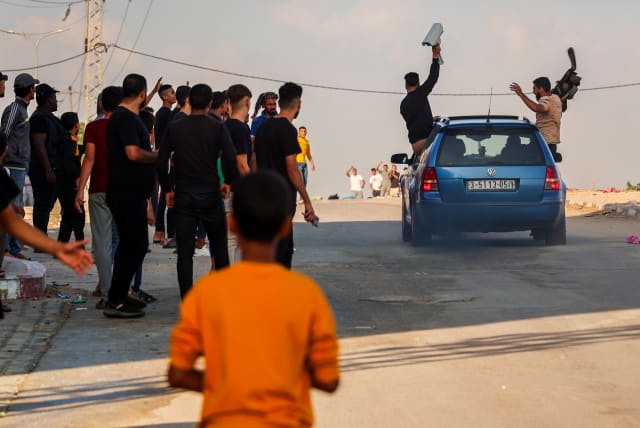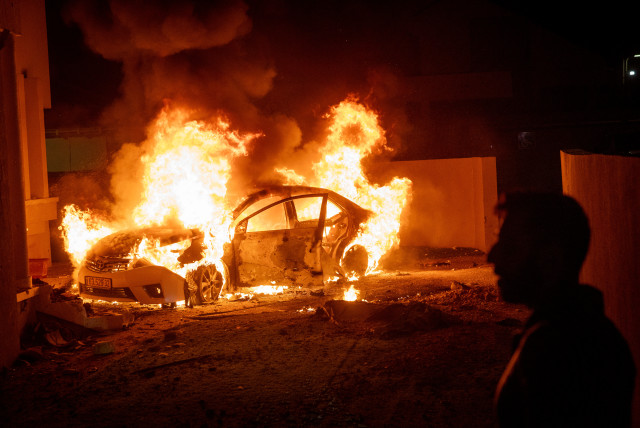Israel cannot, must not, jeopardize future of our country due to blackmail - opinion

We cannot let this bitter debate divide us as a nation, forcing us to again take sides and pitting Israeli against Israeli.
Sadly, this is déjà vu all over again. Our nation, already gripped by a horrific, bloody conflict thrust upon us, is now being divided by an excruciating dilemma: Do we wage all-out war against Hamas, or do we free the Israeli hostages they hold by releasing thousands of bloodthirsty terrorists?
We have been here before. In fact, there have been numerous occasions in the past when we “traded” our prisoners for theirs. After the Six Day War, for example, we sent 6,000 captured Egyptian soldiers back to Egypt, and received 11 of our own. After the Yom Kippur War, 8,400 Egyptians were returned, while 242 of our soldiers were repatriated. There were times when we chose the negotiation route, and times when we preferred the military option, such as our successful 1976 rescue operation in Entebbe, and our failed attempt to liberate Nachshon Wachsman in 1994.
But the watershed event that is most pertinent today was the lopsided exchange in 2011 of 1,027 Palestinian terrorists – including the most vile serial killers and mass murderers in captivity – for one Israeli soldier, Gilad Schalit. It was precisely those freed criminals who, upon release, would immediately begin to plan the massive terror operation that we witnessed on October 7. Indeed, the two masterminds of the Simchat Torah massacre were Ali Qadi (since eliminated by our forces) and Yahya Sinwar (now being hunted), both of whom were freed by the Netanyahu government. They were enthusiastically joined by hundreds of their former cell mates.
I spent many hours arguing against the Schalit deal, both in person and in print (“Too High a Price,” The Jerusalem Post, July 13, 2006). As a bereaved father and emissary of the Almagor Victims of Terror organization, I met with numerous members of the Knesset, trying to convince them that this ill-conceived swap would have disastrous results. Many of the politicians, such as former justice minister Dan Meridor, agreed, saying he had tried in vain to pass a law calling for terrorists to be given the sentence of life in prison with no chance of parole.
Other MKs boasted that “we will know how to deal with any freed killers who return to a life of terror.” That, of course, was an empty, idle threat; Palestinian terrorists take no vacations and know only one vocation: killing Jews at any and every opportunity.
Jewish history: No stranger to 'prisoner exchanges'
Jewish history is also no stranger to “prisoner exchanges.” Jews have been held captive, for ransom, for hundreds of years in dozens of countries. The Talmud (Gittin 45a), in fact, makes note of this and refers to pidyon shvui’im, the release of hostages, as a “great mitzvah” that is incumbent upon the community to perform. “Captivity,” say the sages, “is worse than starvation and death.” Nevertheless, the rabbis qualified the obligation of redemption to exclude situations where payment would either bankrupt the community or encourage more kidnappings in the future.
THE CLASSIC case of hostage-taking was the story of Rabbi Meir ben Baruch, better known as Maharam of Rothenburg, who was the head of German Jewry in the last half of the 13th century. As conditions worsened for the Jews in Germany, many sought to escape the brutal pogroms and draconian taxation by fleeing to the Land of Israel. Emperor Rudolf I, fearing the loss of Jewish gold, declared the Jews his personal property and, in 1286, forbade them to leave Germany.
Maharam vigorously opposed the emperor and attempted to escape the country with his family. But a Jewish apostate informed on him, and the rabbi was imprisoned by Rudolf in the castle of Ensisheim. The emperor demanded an exorbitant ransom before he would free Maharam.
German Jewry was prepared to pay the enormous sum of 23,000 talents of silver for his release, but Maharam himself forbade the exchange, arguing that it would only serve to encourage more kidnappings and extortion within vulnerable Jewish communities. Maharam languished in prison for seven years until he died in 1293; his body was not released for burial until 14 years later, when it was finally redeemed by a wealthy Jew.
His heroic act of self-sacrifice sent the message that there are times when the price of freedom can be too high. By refusing to pay the blackmail that was demanded of his people, Maharam assured that never again would rabbinic leaders be taken hostage.
We now find ourselves caught up once again in a desperate, no-win situation. We can possibly free our 200-plus hostages, or we can fight an all-out war against the Gaza barbarians. But barring an outright miracle, we cannot do both! That is the terrible, but true, fact of the matter.
If we give in to the demands of Hamas and free the murderers, we will ensure that their terrorist network of death and destruction will go on for years and decades to come. No matter how many of them we may succeed in killing, there will always be a new generation of terrorists who will be led and mentored by those we release. They will disperse within Gaza and the Palestinian territories and use their newfound freedom to destroy the very people who gave them that freedom.
Furthermore, we will send a horrendous message to the world – particularly to those Arab nations that fully understand the despicable nature of our enemies and secretly want us to stand firm against these barbarians. If we free the hostages at such a prohibitive cost, we will never, ever, be free of the terror we ourselves will have unleashed upon the world – a world which, in its profound ignorance, praises the victimizers while pummeling the victims. If we do not show strength, the entire world will be made weaker.
To my knowledge, the United States, in all its history, has never once freed a convicted criminal as a result of a hostage being taken. The rule of law and order – an absolute value for any democratic society – is diminished, if not decimated, every time we bow to extortion.
At the end of World War II, American president Harry Truman was informed that a large group of American POWs had died as a result of the nuclear attack on Hiroshima. In a radio broadcast on the night of August 9, 1945, hours after the US dropped the second atomic bomb on Japan, Truman said: “Having found the bomb, we have used it. We have used it against those who attacked us without warning at Pearl Harbor, against those who have starved and beaten and executed American prisoners of war, against those who have abandoned all pretense of obeying international laws of warfare. We have used it in order to shorten the agony of war, in order to save the lives of thousands and thousands of young Americans.”
There can be no decision more difficult than knowing a loved one is in the hands of a tormentor. Our hearts go out to these poor families, and we pray daily that the captives will be reunited with all of us. Family members, understandably, will do all they can to win back their captured relatives, even as they become unwilling pawns of Hamas’ psychological and emotional warfare.
But we, the nation at large, cannot, must not, jeopardize the future of our country by submitting to the blackmail being forced upon us. And we cannot let this bitter debate divide us as a nation, forcing us to again take sides and pitting Israeli against Israeli.
We must be determined, resolute, and fiercely uncompromising in our mission to wipe out the terrorists. And we must be prepared to make the ultimate sacrifice – as so many already have done – to secure the future of the State of Israel and all of the people of Israel. The alternative is unthinkable.
May God give us courage, and bless our army and our actions with success.
The writer is the director of the Jewish Outreach Center of Ra’anana and father of Sgt. Ari Weiss, who fell in battle against Hamas in 2002. Write him at jocmtv@netvion.net.il.
Jerusalem Post Store
`; document.getElementById("linkPremium").innerHTML = cont; var divWithLink = document.getElementById("premium-link"); if (divWithLink !== null && divWithLink !== 'undefined') { divWithLink.style.border = "solid 1px #cb0f3e"; divWithLink.style.textAlign = "center"; divWithLink.style.marginBottom = "15px"; divWithLink.style.marginTop = "15px"; divWithLink.style.width = "100%"; divWithLink.style.backgroundColor = "#122952"; divWithLink.style.color = "#ffffff"; divWithLink.style.lineHeight = "1.5"; } } (function (v, i) { });

